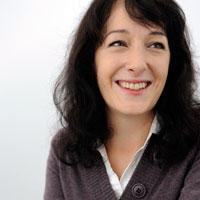
ahans@wellesley.edu
(781) 283-2581
German
A.B., M.A., Ph.D., Harvard University
On leave in the spring and the fall of 2021
Founders 411
Anjeana K. Hans
Professor of German StudiesFocuses on gender, identity, and subjectivity in German film, literature, and culture; teaches at all levels of German curriculum; research on independent films made in Austria in the 1930s and on Weimar cinema.
I am a scholar of German film, literature, and cultural production of the 20th century. I am interested in questions of gender, identity, and subjectivity, in the ways these categories are constructed, and the impact that these constructions have on the individual. I have published articles on sexual identity in Broch’s Die Schlafwandler, on the significance of women’s emancipation in post-WWI uncanny films, and on Leni Riefenstahl’s feature films and her self-staging as the other. My first book, Gender and Uncanny in Films of the Weimar Republic (Wayne State UP), was released in 2014 and focused on “uncanny” films from the Weimar Republic. I look at the way that these films, through their narratives and representations, engage with anxieties coalescing around changing concepts of gender and national identity. In a time marked by radical change, when traditional structures of government and social stratification were fast disappearing and the norms and ideals that had previously defined gender and personal identity were openly challenged, these far-reaching changes found their expression in cinematic narratives that focused on the challenges posed by new notions of personal agency, social mobility, and erotic liberation. At the same time, these films take part in the project of developing the medium itself, self-consciously reflecting on the cinematic process.
In one of my current research projects, I examine the independent films produced in Austria between 1933 and 1937 by filmmakers, screenwriters, and actors who were no longer allowed to work in Germany after Hitler’s rise to power. While most of these films are genre pieces – comedies, historical costume dramas, and musical films predominate –, many nevertheless include key narrative moments and formal components that suggest a preoccupation and/or critical engagement with the traumatic experience of exile and the events occurring in Germany at the time. I have a chapter on one of these exile actors, Franziska Gaal, forthcoming in Rethinking Jewishness in Weimar Film (eds. Barbara Hales and Valerie Weinstein, Berghahn Books). I’m also working on a project tracing images of the other in films from the 1910s and 1920s that focus on the Roma and Sinti, staging these individuals as cultural fantasies that have very little to do with their real lives. In addition, I’m currently co-editing a project focused on the ways in which German classical literature, from what long was termed simply ‘the Age of Goethe,’ connects to and is transformed in the cinematic medium.
I teach all levels of German language, as well as courses on literature and culture of the 19th and 20th centuries and on film. In language classes, I help my students gain not only proficiency in German, but also a sense of German culture and society and an awareness of the connection between languages and culture. I teach literature and culture classes both in German, aimed at German majors, and in English, in order to offer students without familiarity with the German language a forum in which they can gain an understanding of German culture and the ways in which it has affected and is connected to the world community.
Because my current work focuses on lesser-known films that are often not widely available, and because of my interest in the way popular culture reflects crucial cultural anxieties, I spend a lot of time doing research in Germany and Austria. I have worked at the Berlin Kinemathek and at the Filmarchiv Austria, gathering material on films that are unavailable outside of the archives. I find that my students are often particularly interested in the most current developments in German-speaking culture; my time spent abroad allows me not only to advance my research projects, but also to stay connected to the culture in which I grew up and to observe cultural changes that I can integrate into my teaching.
